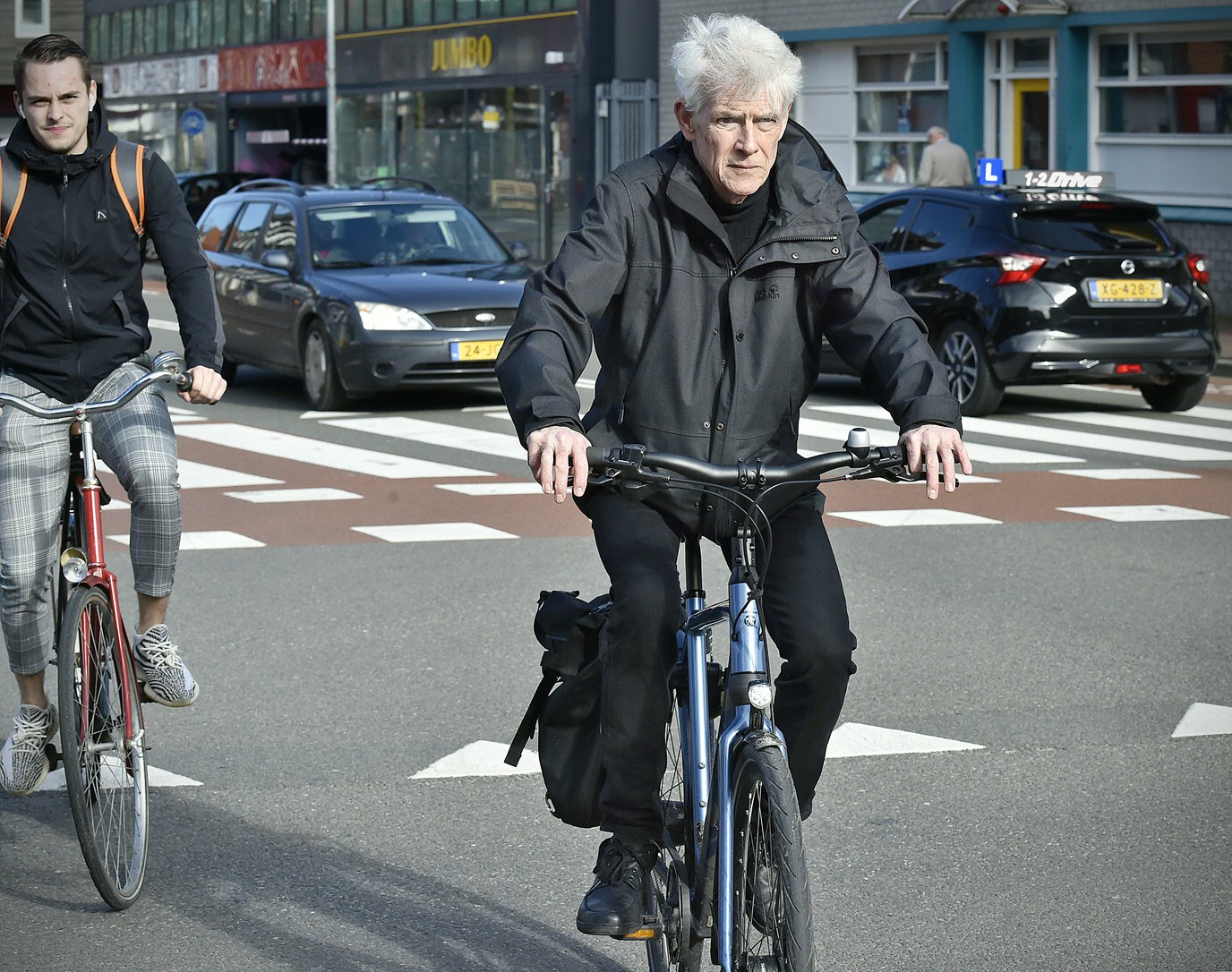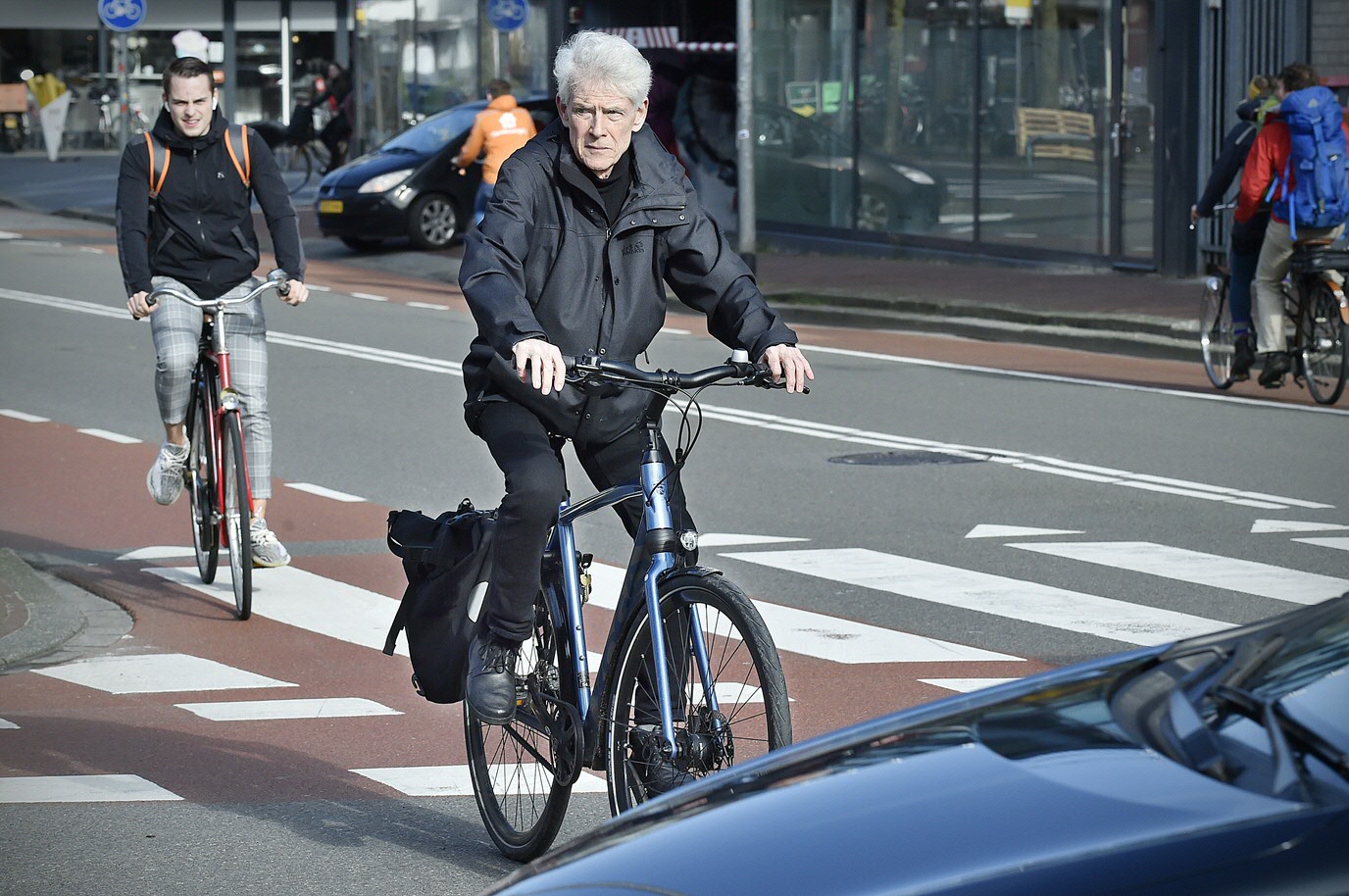‘The elderly should be made to take compulsory lessons before buying an e-bike’

E-bikes, school children on bikes and the elderly in traffic. Professor of Traffic Psychology Karel Brookhuis (himself almost 70) has clear opinions on the subject. Now approaching the end of a long career, he is cautiously stepping down from his soapbox. ‘As a psychologist, there’s not much I don’t know about ageing. You start to lose certain skills. It’s very gradual, so you don’t notice it yourself.’
Text: Riepko Buikema, Communication Office. Photos: Elmer Spaargaren
‘SCREEEEEEECH!’ Karel Brookhuis grasps the edge of the table and tips himself backwards, balancing his chair precariously on two legs. An expletive escapes from his mouth.
It’s fairly a realistic impression of the shocked driver on whose bonnet Brookhuis recently almost landed. ‘Had I seen the car? No. That’s to say I had, but I saw it too late. So no. I missed it. The driver had to slam on his brakes’, he laughs guiltily. ‘I’ll take it as a warning.’
Age, experience, the effect of ageing on our behaviour. These are recurring topics during an interview that lasts an hour and a quarter, in which Brookhuis does most of the talking. He only stops to take a bite out of his sandwich. He’s enthusiastic, impassioned and honest about his inner struggles.
More accidents
‘Taking myself as an example, I can see that I don’t ‘just do’ certain things anymore. It takes me longer to get my head around things. I used to be very decisive: identify the problem, analyse it, work out what needs to be done, wham – decision. These days, I tend to take my time. Have I got the overall picture? This applies to traffic situations too. As you get older, it gets mentally trickier to keep juggling all those balls. You can’t quite see the overall picture. But you don’t notice this process yourself. This is, at least partly, why the elderly have so many accidents.’
Senior citizens are very good at blaming things on everything except getting old, says Brookhuis. ‘I do it myself. Even though I know otherwise: “Karel, don’t bike so fast”. I don’t mind admitting that I find this difficult. I can’t oversee situations as well as I could either. I used to speed up when I approached a crossroads. I thought that there might be a gap, so I could just nip across’, he laughs. ‘I don’t do that anymore.’

Removal boxes gathering dust
Brookhuis’ career has spanned almost 40 years. It’s too late to unpack the removal boxes still standing in his shared office. ‘I retired a few years ago actually. You get kicked out of this type of job when you reach 65. I got kicked out, but I was lucky enough to be offered a one-year contract straight away.’ He is sorry that the end of his long career is now looming on the horizon. His honorary professorship expires in April 2021, and that really will be it. He’s finding this difficult to accept.
‘I enjoy my job. Traffic psychology is an interesting subject. It’s close to my heart. My wife Lena and I have many a “discussion” about how often I’m still here.’ He is gradually stepping down from all his advisory committees and consultative bodies too. Why? In his tight turtle neck jumper and jacket, Brookhuis is every inch the trained cyclist at the top of his game.
Not an impulsive know-it-all
‘I’m certainly very fit. My colleague André Aleman gives me karate lessons twice a week. But as a psychologist, there’s not much I don’t know about ageing. You start to lose certain mental skills. I don’t want to be that impulsive know-it-all in the circles I’m used to moving in.’
Having said this, he immediately adds that he will stay on in the Advisory Committee for Traffic and Transport in the Municipality of Groningen and the Advisory Council of the SWOV Institute for Road Safety Research. After all, his knowledge and experience in traffic psychology is in great demand.

A sympathetic ear in The Hague
He sees this as the greatest triumph that he and his fellow-traffic psychologists accomplished. ‘My mentor John Michon managed to impress the importance of psychology in traffic on governments. Not by looking back to see why something didn’t work, but by taking our expertise to the drawing table. I never failed to make this point whenever I was in The Hague. The success of the traffic psychologists in Groningen, now headed by my colleague Dick de Waard, is partly down to the fact that we’re always prepared to take a train to The Hague at the crack of dawn. These days, everyone embraces the importance of behavioural research, from government organizations to the car and pharmaceutical industry. This is something I’m very proud of.’
Get your children biking
Brookhuis has become intertwined with his bike. You’re never too young to learn, is his motto. ‘My father got me biking when I was four years old. I’m almost 70 now, but I still bike better than three-quarters of all the other cyclists.’ He is eager for the current generation of parents to follow his father’s example. ‘Start biking to school with your children as early as possible, and show them what to do. The younger you start, the more at home they’ll feel in traffic and the safer they will be. I’m categorically opposed to taking children to school by car.’
An end to the harmony on our bike paths
Downstairs, in the bike park of the Faculty of Behavioural and Social Sciences, he proudly shows me his latest acquisition. A blue Koga worth € 1,600, with disc brakes and a belt instead of an old-fashioned chain. The brakes are handy, because modern bikes have brought the relative harmony of our bike paths to an abrupt end.
‘Allowing different speeds in the same traffic lane is hazardous by definition. We can just about cope with e-bikes, but power bikes are a different thing altogether. Our infrastructure just isn’t designed for the increasing volume of two-wheeled vehicles. It’s not easy to go fast in a bike lane. People get frustrated. Everyone wants to go fast and people are bargaining with the safety margins. If you’re in a hurry, you don’t stop at a crossroads unless you really have to.’
Compulsory e-bike lessons
This doesn’t only apply to students, says Brookhuis. Elderly people on e-bikes are just as dangerous. ‘They turn up the speed to maximum and off they go, racing everywhere at 26 km/hour. But their reactions just aren’t up to it! The elderly should really have some kind of guidance before jumping on an e-bike. They need to slow down and give themselves time to brake. Compulsory lessons and a test wouldn’t go amiss, like you do when you want to ride a moped.’
Oops. He’s back on his soapbox. Brookhuis notices it himself and seems startled. But then it’s hard to bridle true enthusiasm, even when you’re almost 70.
More information
- Contact: Karel Brookhuis
| Last modified: | 20 June 2024 07.56 a.m. |
More news
-
17 December 2024
Autism in women: masking takes its toll
Women with autism are often diagnosed later than men. Researcher Yvonne Groen developed a screening tool together with her colleagues to simplify the diagnosis.
-
16 December 2024
Jouke de Vries: ‘The University will have to be flexible’
2024 was a festive year for the University of Groningen. Jouke de Vries, the chair of the Executive Board, looks back.
-
26 November 2024
The fear of eating
Renate Neimeijer conducts research into eating disorders among children and young adults. Her current research focuses on ARFID: avoidant/restrictive food intake disorder.
